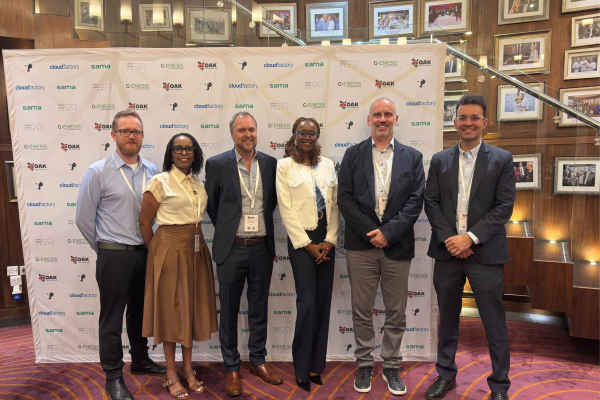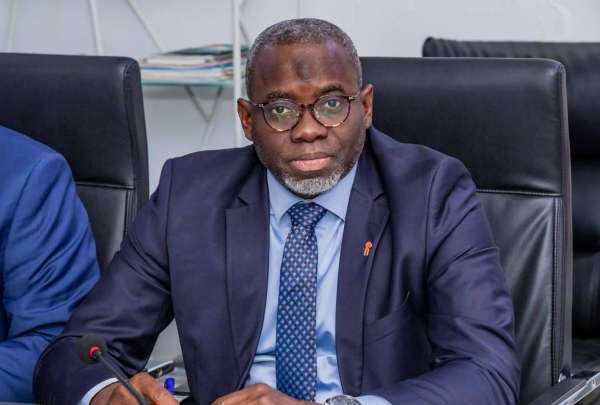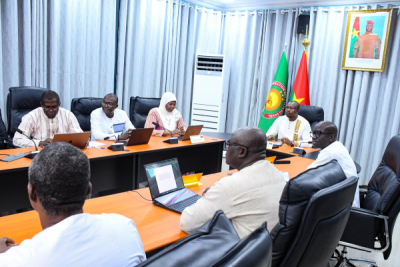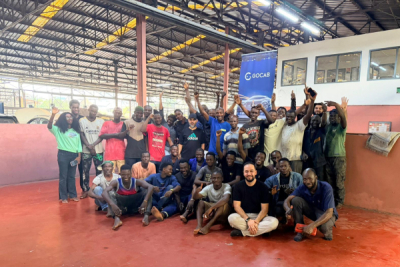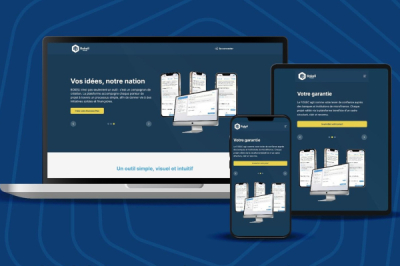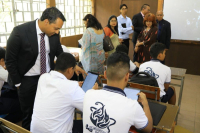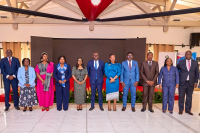
Tech (1150)
-
Kenya launched a private outsourcing coalition targeting 100,000 digital jobs by 2026.
-
Four major operators founded the alliance with government backing.
-
The government linked outsourcing growth to youth employment and training programs.
Kenya targets business process outsourcing to create digital jobs and attract investors as it seeks to position itself as a regional hub for corporate services.
The country faces persistent youth underemployment. In response, policymakers now promote outsourced digital services as a growth engine for employment and foreign investment.
Four major business services operators launched this week the Outsourcing Alliance of Kenya (OAK) in an unprecedented private-sector initiative.
The coalition aims to structure and accelerate the development of Global Business Services, including business process outsourcing and outsourced IT services. The Ministry of Information, Communications and the Digital Economy announced the launch on its X account on Thursday, February 5, marking a new phase for a sector expected to play a central role in job creation.
The Outsourcing Alliance of Kenya officially launched on February 3, 2026, according to a statement published by the ministry.
𝐊𝐞𝐧𝐲𝐚'𝐬 𝐆𝐥𝐨𝐛𝐚𝐥 𝐁𝐮𝐬𝐢𝐧𝐞𝐬𝐬 𝐒𝐞𝐫𝐯𝐢𝐜𝐞𝐬 𝐒𝐞𝐜𝐭𝐨𝐫 𝐑𝐞𝐚𝐜𝐡𝐞𝐬 𝐍𝐞𝐰 𝐌𝐢𝐥𝐞𝐬𝐭𝐨𝐧𝐞𝐬 𝐰𝐢𝐭𝐡 𝐋𝐚𝐮𝐧𝐜𝐡 𝐨𝐟 𝐎𝐮𝐭𝐬𝐨𝐮𝐫𝐜𝐢𝐧𝐠 𝐀𝐥𝐥𝐢𝐚𝐧𝐜𝐞
The Outsourcing Alliance of Kenya (OAK) was officially launched on February 3, 2026, signaling… pic.twitter.com/NjaNNt3g7M
— Ministry of Info, Comms & The Digital Economy KE (@MoICTKenya) February 5, 2026
Government representatives attended the event. Kenyan Wall Street reported that the alliance brings together CCI Kenya, CloudFactory Kenya, Teleperformance Kenya and Sama Kenya. The coalition plans to expand to more than 20 members by the second quarter of 2026 and aims to help create 100,000 jobs across the value chain.
John Tanui, Principal Secretary for ICT and the Digital Economy, said in a speech read at the event that Global Business Services expansion provides inclusive opportunities for young people.
He said the government supports the sector through targeted policies, adapted regulatory frameworks and measures that facilitate access to international markets. He added that the state relies on training programs such as Ajira Digital and Jitume, which aim to equip Kenyan youth with skills demanded by the global outsourcing market, according to the Ministry of the Digital Economy.
This initiative comes as Kenya records an unemployment rate of about 5.2% in 2025, with youth facing particularly difficult labor market conditions.
At the same time, internet penetration reaches 48% in 2025. The rate remains below advanced-market levels, but steady growth strengthens the foundation for digital services and outsourcing development.
This article was initially published in French by Félicien Houindo Lokossou
Adapted in English by Ange J.A de BERRY QUENUM
-
Mourana Soumah takes charge of Guinea’s Ministry of Communication, Digital Economy, and Innovation, merging information, telecom, and digital portfolios.
-
He brings extensive finance experience, having modernized state treasury operations and represented Guinea at the IMF, World Bank, and AfDB.
-
Key priorities include expanding connectivity to over 600 unserved areas, strengthening cybersecurity, and promoting digital innovation in public services and education.
Guinea appointed Mourana Soumah as Minister of Communication, Digital Economy, and Innovation on February 2, President Mamadi Doumbouya’s office announced. The new ministry merges the former Ministry of Information and Communication, previously led by Fana Soumah, with the Ministry of Posts, Telecommunications, and Digital Economy, formerly overseen by Rose Pola Pricemou.
Soumah holds a degree in economics from Université Gamal Abdel Nasser de Conakry, a master’s in economic policy management from CERDI-Université d’Auvergne, France, and a diploma from the ENA Paris-Strasbourg in public finance. He also completed specialized training at the IMF, French Ministry of Finance (Bercy), BCEAO, and institutions in Canada and Morocco.
He served as Minister of Economy and Finance from March 2024, implementing reforms to modernize state financial management, strengthen public treasury operations, and enhance budget credibility. He represented Guinea at the IMF, World Bank, and African Development Bank, and chaired strategic national committees including the Simandou Strategic Committee and the C2D Steering Committee.
Prior to government service, Soumah led the General Directorate of the Treasury and Public Accounting (2021–2024) and the Central Accounting Agency of Treasury Deposits. He contributed to reforms such as the implementation of the Single Treasury Account (CUT), the Integrated State Accounting System (SCIE), and the national payments system.
In his new role, Soumah will focus on modernizing public communication, accelerating digital transformation across government, strengthening national digital sovereignty, and promoting innovation as a driver of economic growth, transparency, and inclusion. Officials plan to expand connectivity to more than 600 unserved areas, develop digital services in education and public administration, and reinforce cybersecurity and local data hosting.
Guinea had 14.2 million mobile connections in 2025, covering roughly 95% of the population, while Internet penetration reached 26.5%, or about four million users, according to DataReportal. Mobile Internet subscriptions have surged nearly 97.4% in recent years, reflecting rapid adoption of digital services and emphasizing the urgency of the government’s digital agenda.
This article was initially published in French by Samira Njoya
Adapted in English by Ange J.A de BERRY QUENUM
-
Burkina Faso connected 370 localities to telecom networks in 2025, expanding Internet and phone access.
-
The government achieved 91% of its 2025 digital objectives, including 272 online public service platforms.
-
Authorities plan to enroll 7 million citizens in a unique electronic ID system and cover 750 additional localities in 2026.
Burkina Faso reported significant progress in implementing its 2025 digital development objectives. The Ministry of Digital Transition, Posts, and Electronic Communications achieved a 91% completion rate, the government said during a review session chaired by Prime Minister Rimtalba Jean Emmanuel Ouédraogo on February 3.
The ministry described 2025 as a “pivotal year” for digital transition. It connected 370 new localities to telecom networks, giving residents their first access to phone and Internet services, and reducing the digital divide.
Authorities also accelerated public administration modernization. They developed or deployed 272 online service platforms, with 146 already operational, facilitating citizen and business access to government services. In addition, the government and La Poste signed an agreement to build 20 “Zama Tchéy” citizen centers, targeting vulnerable populations to improve digital inclusion.
For 2026, the ministry plans to build on these gains. It will implement a unique electronic identification system, aiming to enroll seven million people by year-end. Officials also plan to extend telecom coverage to 750 additional localities, establish a dedicated government network, and develop national messaging and collaboration tools.
The ministry inaugurated a digital infrastructure supervision center in January 2026 to strengthen cybersecurity and manage critical systems. It allocated 61 billion CFA francs (about $109.7 million) to implement these initiatives.
Despite progress, Burkina Faso faces structural challenges. Internet penetration remains low at 22.4%, with 5.42 million users at the end of 2025, according to DataReportal. Mobile connections totaled 29.3 million, or 121% of the population, indicating room to expand digital services.
This article was initially published in French by Samira Njoya
Adapted in English by Ange J.A de BERRY QUENUM
-
GoCab raised $45 million in equity and debt to expand electric and inclusive mobility solutions in Africa.
-
The funding round combined $15 million in equity and $30 million in debt led by E3 Capital and Janngo Capital.
-
GoCab reported more than $17 million in annual recurring revenue across five African markets after 18 months of operations.
In a statement released on Tuesday, February 3, mobility and vehicle financing fintech GoCab announced the closing of a $45 million funding round. The transaction included $15 million in equity and $30 million in debt and aimed to accelerate the rollout of electric and inclusive mobility solutions across multiple African markets.
E3 Capital and Janngo Capital led the funding round alongside KawiSafi Ventures and Cur8 Capital. The company said it would use the funds to strengthen operations in existing markets, enter new high-growth cities and increase the share of electric vehicles in its fleet. GoCab also plans to deploy artificial intelligence-based tools for credit scoring, fleet optimization and risk management.
“In Africa, millions of people remain excluded from both mobility and financing. This funding round allows us to scale while expanding access to ethical financing and accelerating the transition to electric mobility,” said Azamat Sultan, co-founder and executive chairman of GoCab.
Azamat Sultan and Hendrick Ketchemen founded GoCab in 2024 after careers in investment banking focused on structured finance and emerging markets. The company set out to address limited access to financing and vehicle ownership for platform economy workers. GoCab offers a model that allows drivers and delivery workers to generate stable income while gradually acquiring ownership of their vehicles.
After 18 months of operations, GoCab operates in five African markets and reports more than $17 million in annual recurring revenue. The company employs more than 120 people representing 18 nationalities. GoCab supports several thousand drivers and aims to help structure more sustainable urban mobility systems.
As Africa’s platform workforce continues to grow while remaining largely excluded from traditional financial systems, GoCab aims to position itself as a key player in sustainable mobility. Over the medium term, the company targets the deployment of 10,000 operational vehicles and $100 million in annual recurring revenue by combining ethical financing, technology and energy transition.
This article was initially published in French by Samira Njoya
Adapted in English by Ange J.A de BERRY QUENUM
- DR Congo’s Fogec launches Bokeli, a digital platform to streamline business plan development and financing applications for SMEs and startups.
- The platform standardizes information for financial institutions and reduces administrative barriers to credit approval.
- Over five years, Fogec has supported nearly 300 projects, totaling $3.2 million, while Congolese startups raised $2 million in 2024, highlighting the financing gap.
The Entrepreneurship Guarantee Fund in Congo (Fogec) launched a digital platform, Bokeli, on February 3 in Kinshasa to help entrepreneurs structure business plans and submit financing applications electronically. The platform is part of DR Congo’s broader effort to strengthen SME and startup access to credit.
Entrepreneurs can access Bokeli at https://bokeli.fogec.cd/ to create business plans, prepare financial documentation, and transmit their applications to relevant institutions. The system aims to standardize the data required by banks and guarantee mechanisms, while reducing administrative hurdles that slow financing approvals.
Fogec said the initiative addresses a key challenge in the Congolese entrepreneurial ecosystem: many project owners struggle to produce technically sound applications that meet banks’ requirements. “Our mission is to facilitate access to financing for SMEs, startups, and artisans by providing guarantees to viable projects,” the institution said.
The launch comes amid a growing entrepreneurial environment, driven by a young population increasingly engaged in economic activities. Despite this dynamism, access to structured financing remains limited. According to Partech Africa, Congolese startups raised $2 million in 2024, up from $1 million in 2023, still modest relative to market potential.
Fogec said it has supported nearly 300 projects totaling $3.2 million over five years. By offering a digital tool for business planning and application submission, the institution seeks to improve project bankability and facilitate interactions between entrepreneurs, guarantee structures, and financial institutions, boosting national productive capacity.
Samira Njoya
- Cabo Verde launched a €400,000 digital skills program to train up to 3,000 young people for remote and freelance work.
- The program targets youth at home and in the diaspora and aligns training with global market demand.
- Youth unemployment stands at 27.8%, while internet penetration reached 73.5% in 2023.
The Cabo Verde government launched the “Skodji Digital” program last week to train up to 3,000 young people in digital skills. The initiative carries a cost of 400,000 euros, or about $477,000. The government designed the program to help young people participate in the global gig economy, access remote work opportunities, and develop digital microenterprises.
In its first phase, the program will directly support 1,050 participants, including young people living in Cabo Verde and members of the diaspora. The government has opened applications and will keep them open until February 25 through a dedicated online platform. Training programs will last between two and six months, depending on the specialization.
“Skodji Digital provides structured training in digital skills aligned with global market demand, supported access to international digital employment and freelance platforms, activation of careers in emerging digital sectors, and dedicated pathways for digital entrepreneurship and the creation of micro-entrepreneurial initiatives,” the government said in a statement.
The initiative fits into Cabo Verde’s broader digital strategy, which focuses on expanding digital services, attracting international companies, hosting remote workers, and investing in local skills. The country has strengthened cooperation with Portugal to position itself as a pool of digital talent for Portuguese companies. Both sides aim to align training programs with labor market needs and create an environment conducive to testing technological solutions.
The government also views the program as a tool to address unemployment. Cabo Verde has a population of about 600,000 people, mostly young, according to the African Development Bank. The bank reports an overall unemployment rate of 14.5%. Youth unemployment reaches 27.8%, including 33.4% among women and 22.9% among men.
However, the expansion of the gig economy and remote work depends on reliable internet access. According to the International Telecommunication Union, Cabo Verde recorded an internet penetration rate of 73.5% in 2023.
This article was initially published in French by Isaac K. Kassouwi
Adapted in English by Ange J.A de BERRY QUENUM
- Mauritius launched mytGPT Education, a generative AI learning assistant developed by Mauritius Telecom and the Ministry of Education.
- The country ranked first in sub-Saharan Africa on the 2024 Government AI Readiness Index.
- The government began a pilot program in eight public schools covering primary and secondary grades.
Mauritius has integrated generative artificial intelligence into its education system through the launch of mytGPT Education, a teaching assistant developed by Mauritius Telecom and the Ministry of Education. The authorities officially launched the tool on Monday, January 26. The government aims to modernize learning and teaching practices nationwide.
“The implementation of mytGPT Education in schools fully aligns with our strategy, which aims to make artificial intelligence a tool for national progress that is accessible to everyone. Through this project, every child in Mauritius will have access to an AI teaching assistant capable of supporting learning,” said Veemal Gungadin, chief executive officer of Mauritius Telecom.
MytGPT Education relies on generative AI technologies designed to deliver personalized academic support to students. The platform provides explanations tailored to each learner’s level, interactive exercises, and secure content available in English, French, and phonetic Creole. For teachers, the tool automates the creation of quizzes and teaching materials and integrates student performance analytics to guide instructional strategies more precisely.
The government has deployed the project initially as a pilot program for students in Grades 4, 7, 8, and 9. The pilot covers eight schools, including four primary schools and four state secondary schools across the country. The platform already integrates more than 50 teaching resources aligned with the National Curriculum Framework. In parallel, training sessions held between December 2025 and January 2026 introduced teachers to artificial intelligence fundamentals, platform usage, and best practices in prompt engineering.
Through this experiment, Mauritius aligns with a global trend that explores the use of generative AI in education, a segment that remains nascent in African countries. The project opens the way for more personalized learning and optimized teaching resources. However, nationwide scaling will depend on several factors, including the platform’s technological robustness, its integration with existing education systems, data governance for student information, and the education system’s capacity to support teachers in adopting these digital tools over the long term.
This article was initially published in French by Samira Njoya
Adapted in English by Ange J.A de BERRY QUENUM
- Morocco signed three agreements to strengthen training, territorial attractiveness, and high value-added digital offshoring projects.
- The offshoring sector employed about 148,500 people and generated 26.2 billion dirhams in export revenue by the end of 2024.
- Authorities aim to double sector performance by 2030, targeting 270,000 jobs and nearly 40 billion dirhams in exports.
Morocco signed three agreements on Tuesday, January 27, in Rabat to reinforce its digital offshoring ecosystem. Authorities concluded the agreements on the sidelines of a meeting focused on renewing the country’s national offshoring offer. The partnerships aim to support skills training, improve territorial attractiveness, and encourage the establishment of high value-added projects.
The agreements focus in particular on the rollout of a training incentive designed to align workforce skills with the needs of digital companies. They also provide for the development of Tech Valleys Offshoring through the creation of specialized economic hubs. These hubs will integrate technological infrastructure, shared services, and dedicated spaces to host both domestic and international investment.
The signing of these agreements comes as the global offshoring market undergoes rapid transformation driven by service digitalization, cloud computing, data expansion, and artificial intelligence. In this new environment, traditional destinations now compete with emerging hubs, especially across Africa.
Morocco seeks to consolidate its position by promoting a more structured offering that focuses increasingly on digital professions and high value-added services. Authorities see this repositioning as essential to maintaining competitiveness in a shifting global landscape.
Offshoring now ranks among the main contributors to Morocco’s service exports. By the end of 2024, the sector employed nearly 148,500 people and generated more than 26.2 billion dirhams ($2.8 billion) in export revenue.
At the same time, activities are gradually evolving. Traditional call centers are losing ground, while IT services, engineering, and specialized digital functions continue to expand. Moroccan authorities aim to double the sector’s performance by 2030, targeting 270,000 jobs and nearly 40 billion dirhams in exports.
Through these partnerships, the government aims to enhance the competitiveness of the “Made in Morocco” digital services offer on the global market. Authorities expect skills development, the structuring of specialized territorial hubs, and increased investor visibility to serve as the main growth levers.
Over time, these agreements could help attract new technology projects, support qualified employment, and strengthen Morocco’s position as a regional digital services platform serving both European and African markets.
This article was initially published in French by Samira Njoya
Adapted in English by Ange J.A de BERRY QUENUM
-
President Bola Ahmed Tinubu approved the acquisition of two new telecom satellites to replace Nigeria’s aging NigComSat-1R.
-
The government aims to support digital transformation, broadband expansion, and Nigeria’s $1 trillion economy target.
-
Authorities estimate the satellite replacement project at about $500 million and have opened it to multiple investors and suppliers.
Nigerian authorities are advancing plans to acquire two new telecommunications satellites to strengthen national digital infrastructure. President Bola Ahmed Tinubu approved the initiative, Communications, Innovation and Digital Economy Minister Bosun Tijani said, according to local media reports.
Tijani made the announcement on Wednesday, January 28, in Abuja during a press conference held on the occasion of World Data Privacy Day, which the Nigeria Data Protection Commission organized.
The two new satellites will replace NigComSat-1R, the only communications satellite Nigeria has operated since December 2011. Authorities launched NigComSat-1R to replace NigComSat-1, which China supported and launched on May 13, 2007, but lost shortly after deployment. Engineers designed NigComSat-1R for a 15-year lifespan, which placed its expected end of service in 2026. However, the government announced in September 2025 that it extended operations until 2028.
According to the minister, the satellite acquisition fully aligns with Nigeria’s digital transformation ambitions. He said the government is simultaneously deploying 90,000 kilometers of fiber-optic infrastructure, a project that has reached 60% completion. Digital technology plays a central role in President Tinubu’s strategy to build a $1 trillion economy. Satellites can expand access to information and communication technologies in a country where GSMA estimated that 120 million people lacked mobile internet access at the end of 2023, out of a population of 223.8 million.
As early as 2016, the Nigerian government expressed its intention to acquire two new telecom satellites and estimated the project cost at about $500 million. At the time, the executive branch said it was negotiating a loan with the Export-Import Bank of China, following the financing model used for the first satellite.
However, Nigerian Communications Satellite Limited Chief Executive Officer Jane Nkechi Egerton-Idehen said in a September 2025 interview with TechCabal that this financing structure no longer represents the sole option. She said the process is now open and that several suppliers and investors have submitted bids.
Beyond financing considerations, Egerton-Idehen emphasized that Nigeria also seeks to preserve its orbital slots, which represent the positions allocated to each country for satellite deployment. NigComSat-1R currently occupies one of the three orbital slots assigned to Nigeria by the International Telecommunication Union.
This article was initially published in French by Isaac K. Kassouwi
Adapted in English by Ange J.A BERRY QUENUM
- Cybastion and Gabon’s ANINF launched a free national digital and cybersecurity training program for 1,000 young Gabonese.
- The program offers three training levels, from basic digital literacy to certified specializations in networks and cybersecurity.
- The initiative builds on a 2025 Gabon–U.S. partnership to support digital infrastructure and youth employability.
U.S. technology company Cybastion and Gabon’s National Agency for Digital Infrastructures and Frequencies (ANINF) officially launched the free program on Tuesday, Jan. 27. The initiative targets young Gabonese seeking skills in digital technologies and cybersecurity.
Presenting the Africa DigiEmpower program, Antonia Akouré-Davain, managing director of Cybastion Gabon, said the country must develop local talent to sustain its digital transformation drive. She said the program aims to support the modernization of Gabon’s digital infrastructure while equipping young people and women with market-ready skills to improve their employability in both the public and private sectors.
The training framework includes three levels, ranging from entry-level courses to advanced technical specializations. The first level, open to participants without prior qualifications, focuses on basic computer skills and the use of digital tools. Advanced levels offer certification tracks in networking, cybersecurity and digital technologies to meet rising demand in the sector.
The program extends a partnership signed in 2025 between Cybastion and the Gabonese state to accelerate digital infrastructure development and provide the workforce with globally competitive digital skills. ANINF, a key project partner, will host the training through the ANINF Academy at its headquarters in the ANINF Tower and will support participants throughout the program. The agency said it may recruit top-performing trainees for national digital transformation projects.
Beyond Gabon, the initiative reflects a broader continental challenge. The World Bank estimates that more than 230 million jobs in sub-Saharan Africa will require digital skills by 2030, in a region where nearly 60% of the population is under 25. By investing in training, Gabon aims to strengthen its human capital, boost youth employment, support the digital economy and position itself within Africa’s growing role in the global digital economy.
This article was initially published in French by Samira Njoya
Adapted in English by Ange J.A de BERRY QUENUM
More...
- Somalia’s parliament approved a cybersecurity law that creates a national governance framework and new response institutions.
- The law establishes a national incident response team, a nine-member cybersecurity committee and an emergency response center.
- The move follows recent cyberattacks, including a 2025 breach of the e-visa platform, and comes as Somalia ranks Tier 4 in the ITU’s Global Cybersecurity Index.
Somalia’s parliament approved the cybersecurity law on Monday, Jan. 26, strengthening the country’s regulatory framework as authorities intensify efforts to secure national cyberspace.
𝐒𝐨𝐦𝐚𝐥𝐢𝐚’𝐬 𝐏𝐚𝐫𝐥𝐢𝐚𝐦𝐞𝐧𝐭 𝐀𝐩𝐩𝐫𝐨𝐯𝐞𝐬 𝐭𝐡𝐞 𝐂𝐲𝐛𝐞𝐫𝐬𝐞𝐜𝐮𝐫𝐢𝐭𝐲 𝐋𝐚𝐰
— NCA Somalia (@SomaliaNCA) January 26, 2026
Mogadishu, Somalia – January 26, 2026 — The House of the People of the Federal Parliament of Somalia has today officially approved Somalia’s Cybersecurity Law, which aims to protect… pic.twitter.com/7XOgRDLp5A
The National Communications Authority (NCA) said the law establishes a national cybersecurity management framework. The text defines the responsibilities of the Ministry of Communications, assigns a technical role to the telecom regulator, sets obligations for operators of critical infrastructure and details mechanisms for prevention, reporting and response to cyber incidents.
The law also provides for the creation of the Somalia Computer Incident Response Team (SOM-CIRT), alongside a nine-member cybersecurity committee and an emergency intervention center tasked with coordinating rapid responses to cyber incidents.
“The cybersecurity law should play a key role in strengthening digital trust, supporting the growth of the digital economy and intensifying cooperation between public institutions, the private sector and international partners,” the telecom regulator said in a statement.
The approval follows earlier legislative steps. In August 2025, the Somali government approved a draft cybercrime bill. In March 2023, the Data Protection Act entered into force and led to the creation of the Data Protection Authority (ADP), which oversees enforcement of data protection rules.
Beyond domestic regulation, Somalia has pursued international cooperation to protect its cyberspace. The country signed a memorandum of understanding with Malaysia in August 2025, which authorities view as a global benchmark in cybersecurity. Earlier, in November 2024, Somalia strengthened cooperation with the United Nations Office on Drugs and Crime (UNODC) to bolster its capacity to combat online crime.
These initiatives come as cyber threats intensify. In his report State of Cybersecurity in Somalia 2024, Abdullahi Guled, a consultant to the Ministry of Communications, said Somalia recorded several cyber incidents in 2024, although authorities did not disclose many of them publicly. The incidents included ransomware attacks against public institutions and phishing attempts targeting the financial sector.
In November 2025, hackers breached the e-visa platform and compromised the personal data of several thousand people, highlighting vulnerabilities in government digital systems.
Somalia ranked in Tier 4 out of 5 in the International Telecommunication Union’s Global Cybersecurity Index 2024, which the ITU said “demonstrates a basic commitment to cybersecurity.” The country scored 37.38 out of 100 and still needs to strengthen technical, legal and capacity-building measures to improve resilience.
This article was initially published in French by Isaac K. Kassouwi
Adapted in English by Ange J.A de BERRY QUENUM
- Kenya plans to launch a digital platform to automate external debt payments, improving transparency and reducing processing delays.
- External debt totals roughly $42 billion, nearly half of the country’s public debt.
- The platform integrates key systems, including Meridian debt management and the Central Bank exchange-rate system.
Treasury Principal Secretary Chris Kiptoo disclosed the initiative on January 27, following a project briefing attended by officials from the Budget Office, Auditor General, and World Bank representatives.
The system is scheduled to go live on Monday, February 2, 2026, with a one-month parallel run to ensure a secure transition.
The platform will integrate several core components: the Meridian debt management system, the Central Bank of Kenya’s exchange-rate system, and the Treasury’s payment request and approval processes.
This architecture will automate the entire payment chain—from instruction generation to approval and execution—replacing manual workflows with secure digital processes.
Chris Kiptoo said the platform “should reduce delays and errors while improving oversight of the country’s financial obligations.”
Kenya’s external debt stood at about 5.5 trillion shillings ($42 billion) at the end of 2025, nearly half of its total public debt, which exceeds 11 trillion shillings.
Fitch Ratings highlighted growing financing needs and stressed the importance of efficiently managing external borrowing in 2026.
The digital platform aims to accelerate transaction processing, enhance transparency, and improve public fund traceability. It should also facilitate coordination among government agencies and strengthen financial oversight.
The Treasury acknowledges potential cybersecurity risks in moving to a fully digital system.
Officials must safeguard against intrusions, fraud, and technical failures. Protecting sensitive data and ensuring system resilience will be critical to guarantee reliable and uninterrupted debt service.
This article was initially published in French by Samira Njoya
Adapted in English by Ange J.A de BERRY QUENUM
-
Zimbabwe and Australia discussed bilateral cooperation on artificial intelligence and ICT development.
-
President Emmerson Mnangagwa plans to launch Zimbabwe’s national AI strategy in March 2026.
-
Australia offered technical support as Zimbabwe expands digital investment and connectivity.
Zimbabwe continues its digital transformation drive. Information Communication Technology, Postal and Courier Services Minister Tatenda Mavetera met Australia’s ambassador to Zimbabwe, Minoli Perera, on Monday, January 26, 2026. The meeting focused on exploring bilateral cooperation opportunities in information and communication technologies.
The discussions centered on Zimbabwe’s forthcoming national artificial intelligence strategy. President Emmerson Mnangagwa plans to launch the strategy in March 2026. The roadmap aims to define national priorities for digital innovation, public service modernization, and technological skills development.
Official data showed rising momentum in Zimbabwe’s digital sector. ICT investments increased by 14.5%, alongside improvements in connectivity. Mobile penetration reached 103%, while internet penetration rose to 83%. These figures reflected broader access to digital services across the population.
Australia signaled readiness to support Harare through technical assistance and expertise sharing. Canberra operates an advanced national AI framework. In December 2025, the Australian government unveiled a National AI Plan to accelerate adoption across the economy.
McKinsey estimated that artificial intelligence and automation could generate between $170 billion and $600 billion in additional GDP for Australia by 2030.
The proposed cooperation could cover training, skills transfer, AI governance, and support for local start-ups. Harare aims to structure a job-creating digital ecosystem. The objective carries demographic urgency, as more than 60% of Zimbabwe’s population stands under the age of 25.
Through closer ties with Canberra, Zimbabwe seeks to strengthen its regional technological position. By prioritizing artificial intelligence and international partnerships, the country aims to use digital development as a strategic lever for economic diversification and sustainable growth.
This article was initially published in French by Samira Njoya
Adapted in English by Ange J.A de BERRY QUENUM
- Egypt’s parliament plans legislation to restrict children’s access to social media platforms.
- President Abdel-Fattah el-Sissi publicly urged age limits on minors’ social media use.
- Egypt joins a global regulatory trend as Africa lags in child online protection frameworks.
Egypt’s parliament announced on Sunday, January 25, its intention to draft legislation regulating children’s use of social media. The House of Representatives released the information in an official statement. The statement said the draft law aims to limit the negative effects of digital exposure on minors, including psychological and behavioral risks associated with early use of social platforms.
Lawmakers said they plan to hold consultations with the government and specialized institutions. The process aims to design an appropriate legal framework. The framework seeks to establish mechanisms to control children’s access to social media. The framework also seeks to regulate the practices of digital platforms operating in Egypt.
The initiative follows direct political momentum. President Abdel-Fattah el-Sissi called on the government and parliament one day earlier to examine restrictions on children’s social media use. The president said authorities should consider limits until children reach an age at which they can “manage properly” these digital tools.
Through this move, Egyptian authorities align with a growing global debate over child protection in digital spaces.
Several countries have already adopted concrete measures to regulate minors’ access to social platforms. In France, the National Assembly recently approved at first reading a bill banning social media for children under 15.
Australia adopted a landmark law in December 2025 banning access to social media for children under 16. The law requires platforms to delete non-compliant accounts. The law also imposes heavy fines for violations.
Online child protection remains uneven across Africa. The International Telecommunication Union said that only 39 African countries had adopted a national child online protection strategy in 2024.
At the same time, 32% of African states remained in the drafting phase. Meanwhile, 41% of countries had taken no action. The situation contrasts with rapid digital growth. The ITU said one child worldwide connects to the internet for the first time every half-second.
For Egypt, adoption of such legislation could strengthen protections against digital risks. These risks include cyberbullying, exposure to inappropriate content, and social pressure linked to intensive screen use.
However, the legislative process remains complex. Member of parliament Amira El-Adly recently highlighted the lack of reliable official data on children’s internet use in Egypt. She also cited the absence of verified data on psychological and behavioral impacts. This data gap could complicate the creation of a framework that is effective, balanced, and enforceable.
This article was initially published in French by Samira Njoya
Adapted in English by Ange J.A de BERRY QUENUM


